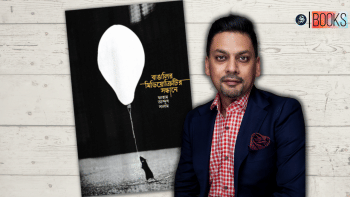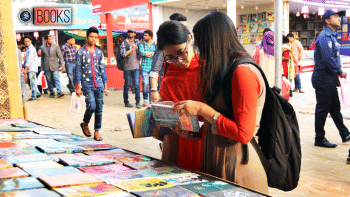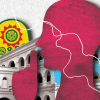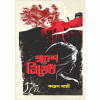Choose books, not bans
There are a few things to be noted regarding this year's Amar Ekushey Boi Mela, one of which is the expectation that this would be the year of recovery. After two years of writers, publishers, and publications being held hostage by the pandemic, last year's Boi Mela was able to exude a sense of normalcy. But then, of course, a national economic crisis hit soon afterwards.
One key issue that must be highlighted as it has been significantly affecting this sector, is the increase of paper price. The price hike of paper has been a major hurdle, but was not addressed with the seriousness it deserved. The price of paper has been an issue for our sector for a long time, but the situation escalated unusually last year, and therefore drew the attention of the media as well as the policymakers. What is most regrettable is that, even after paying high prices for locally produced paper, publishers are not receiving goods of their desired quality. This is something that needs to be highlighted throughout the year, and not only during the book fair season. If a state deems it important to move towards a knowledge economy, the price of paper – an essential item for knowledge products – have to be taken into serious consideration.
While producing new books was a challenge this year, publishing houses have tried hard to keep the promises made to authors and readers. We need to bear in mind that the publication industry supports the livelihoods of many people.
As for the quality control of books and publishers showcased at Boi Mela, the Bangla Academy certainly has a role to play. As publishers, we also want the academy to play this role constructively and host the book fair as a non-partisan entity. However, I believe that there is a scope for the book fair policies to be reviewed. One may have disagreement with what a book may be condoning, but that should be addressed with a counter-argument made in another book, and not by means of undue censorship.
We believe that the freedom of expression of writers and publishers must be preserved. The Bangla Academy and our cultural affairs ministry is tasked with upholding the interests and rights of publishers and writers. For these institutions to instead become a barrier to our freedom of expression can only be described as tragic. I hope these institutions that we respect deeply also realise that irrational embargoes can only make way for situations that come back to haunt those who impose these restrictions.
The least we can say is that the policies should be applied across the board with the rights of readers, writers, publishers and other stakeholders in mind, and not to serve the interest of a coterie of publishers with privileged access to policymakers, and particularly not at a time of deep financial crisis.
Publishers nowadays are having to work through a lot of challenges, but one hopes that some scope for discussions and dialogue will open up. I believe that the current policies in place at Boi Mela are somewhat well thought out, but I am not sure if the policies are uniformly applied in order to maintain the quality of books showcased at the fair, or to sufficiently prevent pirated books being displayed, or to offer some level of fairness for publishers of all capacities.
We have no option but to remain hopeful that the institutions tasked with regulating Boi Mela will open up space for dialogue. When these regulations are reviewed in the future, we hope that active participation of all stakeholders will be sought. After all, Amar Ekushey Boi Mela does not just belong to the Bangla Academy; it belongs to the publishers, writers and readers as well.
Lastly, we hope that our freedom of expression – which we believe is our constitutional right in a free country – will be ensured, and that the relevant government organisations will play the most significant role in upholding our rights.
Transcribed and translated by Afia Jahin.
Mahrukh Mohiuddin is the managing director of The University Press Limited (UPL).

 For all latest news, follow The Daily Star's Google News channel.
For all latest news, follow The Daily Star's Google News channel. 










Comments